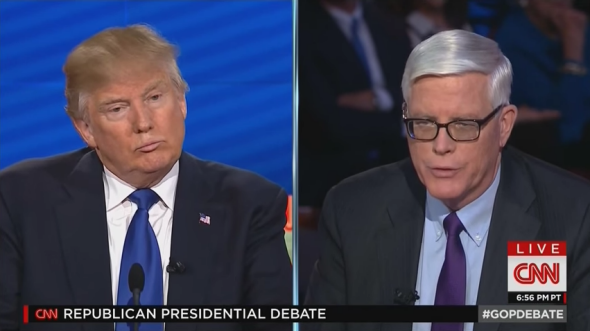Donald Trump’s open admiration for Vladimir Putin’s repressive, militarily belligerent regime in Russia is back in the news again. One of the most important principles of modern American Republicanism, meanwhile, has long been respect for Ronald Reagan, who is famous for having had a morally unambiguous view of the Soviet Union: The Soviet Union was bad, Reagan said, because it encouraged the proliferation of governments that suppressed individual political, religious, and economic liberty. Putin’s Russia, while not communist, is highly repressive of individual liberties and does not foster a system of free enterprise as American conservatives would define the idea. It is also consistently aggressive in trying to expand its sphere of influence. Which means that Reaganite conservatives are rejecting Trump’s praise of Putin, right?
Not all of them! First, proud Reagan-o-phile Mike Pence, Trump’s semiconscious running mate, went on TV to back up his boss:
“I think it’s inarguable that Vladimir Putin has been a stronger leader in his country than Barack Obama has been in this country,” Gov. Mike Pence of Indiana, Mr. Trump’s running mate, said on CNN, defending Mr. Trump by echoing his latest praise for the Russian leader, offered Wednesday night in a televised candidate forum.
On Friday, conservative radio host and TV pundit Hugh Hewitt—a stalwart Orange County Republican who worked in the Reagan administration—gave something of the intellectual Reaganite’s case for Trump’s Putin comments.
After what has been—to give credit where it’s due—a significant backlash from #NeverTrump conservatives, Hewitt has tried to clarify that he’s speaking about Putin from the perspective of strategic strength and not because he admires his governance on the merits.
Now, it’s true that one can respect a foreign leader’s grasp of geopolitical strategy without admiring his or her ideology. But that’s not what Trump is doing, and that’s where Hewitt’s reasoning fails. Where Reagan obviously despised communism, the most Trump has ever done by way of criticizing Putin or Russia’s ideology is suggesting tepidly that he doesn’t “happen to like” the country’s system of government. But that is jiggery-pokery: There is no difference between Vladimir Putin and Russia’s system of government. Putin’s style of leadership is not distinct from the substance thereof; Russia’s government is what Putin says and does—and Trump likes the things that Putin says and does because they are strong, manly, macho things.
Trump, moreover, doesn’t even advocate for the projection-of-power foreign policy whose effectiveness Hewitt believes Putin has demonstrated. To the extent Trump has a foreign policy at all, it is one of paranoid isolationism. His Muslim visa ban would immediately alienate all the allies we currently have in the Middle East. He’s threatened to go deadbeat on our partners in NATO, and his presumptive trade policy would—for better or worse—drastically reduce American businesses’ and investors’ access to foreign markets. I suppose he does want to “take the oil” from Iraq because “to the victors belong the spoils,” which would be a demonstration of strength, but it’s hard to call that random assertion of medieval moral reasoning a policy, much less a Reagan-esque one.
The biggest irony of all is that there already is a candidate in the 2016 race who has an unequivocal record of supporting the kind of saber-rattling Team America: World Police initiatives that Hewitt is calling for—Hillary Clinton, the candidate who backed American military interventions in Iraq and Libya and whose convention was a celebration of militaristic patriotism. The idea that Clinton would be more aggressive than Obama in using American power was in fact a reason a lot of Democrats voted against her in the primary. Periodic demonstrations of military strength in the (ostensible) defense of American values are pretty much her thing.
“I think [Trump] ought to begin every statement about Russia by saying Putin is an evil man,” Hewitt said Friday on MSNBC. But that’s not going to happen because that’s not what Trump thinks, and it’s not how Trump says he would govern. Whether or not Hugh Hewitt will admit it, if he wants to advocate for the candidate who would show the most backbone in our country’s perennial confrontation with Russia, he’s with her.
